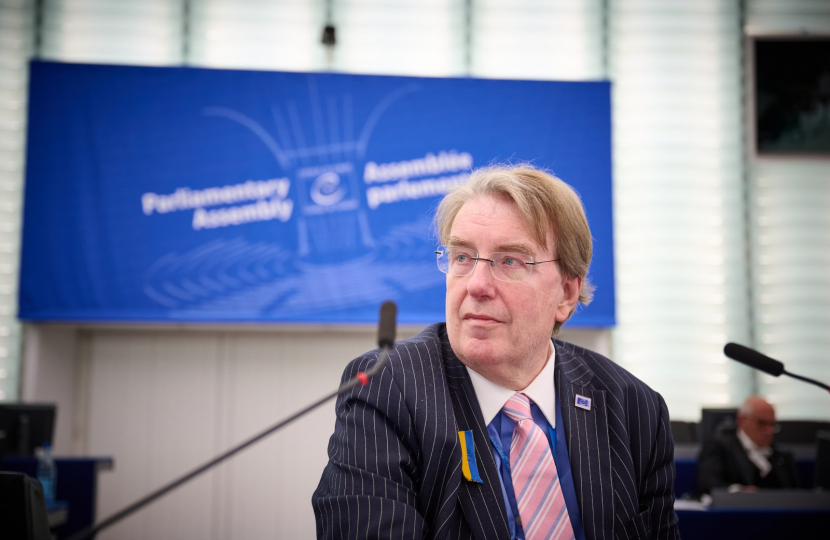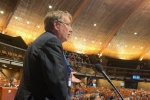
The Parliamentary Assembly of the Council of Europe has four Plenary Session each year. Below is John's Delegation Leader report for the October 2023 session.
REPORT OCTOBER 2023 PLENARY SESSION
The 4th Plenary Session of the Council of Europe took place in Strasbourg. It occurred at the same time as the attack by Hamas in Southern Israel in which some 1300 Israelis were killed and 3,300 were wounded. This attack played an important role in the proceedings of the Assembly and in the debate which took place. I spoke in this debate. In addition, debates were held on other crises around Europe including Nagorno-Karabakh, North Kosovo, Ukraine, and Afghanistan. A debate was also held on the situation of Osman Kavala, the Turkish human rights prisoner, for whose release the Assembly urgently called and for the ECHR judgements to be implemented. Mr Kavala had earlier in the proceedings been presented with the Vaclav Havel Human Rights Prize, which was collected by his wife in his absence in prison.
A debate was also held entitled ‘The challenge of far-right ideology to democracy and human rights in Europe’ in which the common values of human rights, democracy and the rule of law were stressed. It was pointed out too that far-right extremism was not a new phenomenon and consisted of elements such as xenophobia; anti-Semitism; Islamophobia; and, other kinds of violence. This was inevitably a controversial debate which divided the Assembly.
In addition, a debate was held on the role of the Council of Europe in preventing conflicts, restoring credibility of international institutions and promoting global peace. Despite the number of international crises in Europe today, it was generally acknowledged that the Council of Europe had prevented conflicts, but that reform was still required for it to turn concerns into alerts and alerts into measures to reduce tensions with action.
Although the election of the new Commissioner of Human Rights takes place at the next meeting in January, I presented my approach as the UK candidate to the Committee of Ministers and to two of the largest political groups.
The details of debates I outlined below.
Prize Award Ceremony: Václav Havel Human Rights Prize. This was the eleventh year in which the prize had been awarded. The three shortlisted candidates were Mr Yevgeniy ZAKHAROV, from Ukraine; Ms Justyna WYDRZYNSKA from Poland; and Mr Osman KAVALA from Turkey. The winner was Mr Kavala. All those shortlisted represent causes greater than themselves and the prize also paid tribute to all defenders of human rights who, sometimes at the cost of their lives, stood firm to protect and promote fundamental freedoms and human rights.
Progress report of the Bureau and the Standing Committee. This regular report looked at how the Council of Europe had performed since the last plenary session. It was addressed by three members of the UK Delegation: Ian Liddell-Grainge MP, John and Lord Blencathra (in written form). The issue of Osman Kavala was raised and the need to take seriously the election of judges to the ECHR. The issue of the Montenegrin elections were also raised and the need to take the diaspora seriously.
The situation in the North of Kosovo* following the recent attack and the need for de-escalation. The debate was opened by Lord Blencathra. Lord Blencathra set out the background to recent disputes between Serbia and Kosovo. He said that unless the disputes were checked, the situation in northern Kosovo stands to worsen, including by escalating into more serious fighting between Kosovans and Kosovan Serbs. He urged the Kosovans to hold genuine elections and called on the Quint, NATO and EU to tell Serbia to stop interfering. Ian Paisely MP hoped that the debate would allow members to stand shoulder to shoulder with Kosovo.
As a Delegation, we also met the Foreign Minister of Kosovo whose message was that the UK was being ignored when action was being taken in the country and that she would like to see more of the UK back in action.
The Assembly held a question time with the Secretary General, Mrs BURIC. It also held a question time with the chairman of the Committee of Ministers. It also held a question time with Mr Didier REYNDERS, European Commissioner for Justice.
The challenge of far-right ideology to democracy and human rights in Europe. In this debate Jeremy Corbyn MP commented on the number of right-wing politicians in national parliaments and how a significant number of conservative MPs were calling for withdrawal from the European Convention on Human Rights. He said it was important to stand up for the principles of human rights. He pointed to racism, anti-Semitism, Islamophobia, anti-Black racism in what right-wing politicians were saying.
Sally-Ann Hart MP pointed out that open societies and the protection of human rights around the world were vital and that the left has lost its way in ‘a fog of despotic entitlement’. She said that it was crucial to find a balance between fostering diversity and addressing the grievances of those who may have turned to the far right out of fear and frustration. She said that governments must address the root causes.
John said it was unfortunate to be trapped in seeing the world as right-wing or left wing. Europe was becoming a world of extremists. Europe was no less clean than anywhere else; Greece had been run by the colonels. Spain and Portugal only lost their fascist governments in 1975. And on the other side, many countries of Eastern Europe have had communist governments of an extreme nature. He said he believed in human rights, the rule of law, and the power of democracy. He pointed out that Hamas had an ideology, but it is not a left-right ideology. It describes itself as having an anti-Zionist ideology. This is illustrative of the sort of extremism that he believed we see about Europe at the moment.
The honouring of membership obligations to the Council of Europe by France (periodic review). This debate was chaired by John. Sir Edward Leigh MP said that in his opinion, there was no doubt that France was founded on fundamental principles such as democracy, human rights, and the rule of law. The UK had the most immense respect for France and many of the points raised by the report could be found elsewhere in Europe. France should not be attacked in what was a periodic report.
Escalation of violence in the Middle-East following the recent Hamas attack on Israel. The debate was opened by an Italian delegate, Piero Fassino. He said that the whole world was shaken by the chilling images: children killed in their sleep, homes devastated by thousands of missiles on a defenceless population, hundreds of young people slaughtered while peacefully attending a concert, families exterminated in their homes, citizens kidnapped and deported to be hostages or even human shields. Barbaric and terrorist acts that question us as human beings and for which there can be no justification. John participated pointing to the overall numbers. He also pointed out to the suffering caused over many years in the town of Sederot and how he had experienced in Jerusalem a rocket attack. He also commented on the point made by the late Lord Sacks about the Hebrew words for ‘strength’.
Pegasus and similar spyware and secret state surveillance. A debate occurred on this subject.
Preventing and combating violence against women with disabilities. Sally-Ann Hart MP commented that ending all forms of gender-based violence was an urgent priority for the UK government and the UK’s commitment to the Istanbul Convention was well–documented. She also said that this resolution was a very positive step and deserved our support. Violence against women was a global issue, affecting different cultures, ages and social groups. It was not a singular issue.
Joint debate: The role of the Council of Europe in preventing conflicts, restoring credibility of international institutions and promoting global peace / Ensuring a just peace in Ukraine and lasting security in Europe. In a written speech, Sally-Ann Hart MP said that the Council of Europe was an institution inherently dedicated to the protection of human rights, upholding the rule of law and the preservation of democracy. The Council of Europe endeavoured to address tensions and conflicts that may arise and was an effective forum for international cooperation. Despite the conflicts across Europe, she believed that the Council of Europe had indeed prevented more conflict on our continent than might otherwise be the case. Russia’s invasion of Ukraine was an example where the Council of Europe has taken robust action. The European Convention on Human Rights, the Council of Europe’s most famous achievement did so much more good than harm, and the European Court of Human Rights was a respected body. However, she believed that political issues should not be questions of law for judges.
Humanitarian situation in Nagorno-Karabakh. A debate was held on the situation in Nagorno-Karabakh. Sir Christopher Chope MP spoke to say behind the current problem lay the Russian Federation. He asked whether it was surprise that we had a problem when Russian sympathisers continued to create division and to cause division and take advantage of that? He thought that the Assembly should be uniting together and supporting both Armenia and Azerbaijan in resolving this conflict.
Call for the immediate release of Osman Kavala. Sir Christopher Chope MP called for 29 October – the celebration of the centenary of Turkiye’s foundation as a modern democracy by Mustafa Kemal Atatürk – for the release of Mr Osman Kavala. The Committee of Ministers had ultimate responsibility for the execution of court judgments. He referred to the complementary joint procedure set out in Resolution 3219. The action of Turkiye gave a lie to those people who have suggested that Türkiye was normally very good at dealing with the Court’s judgments. He did not think the country should be able to continue to ignore judgements with impunity.
Debates were also held on:
- Examining the legitimacy and legality of the ad hominem term-limit waiver for the incumbent President of the Russian Federation
- Preventing addictive behaviours in children / Mental health and well-being of children and young adults
- The humanitarian crisis emerging for Afghanistan and Afghan refugees.
The next Plenary Session of the Parliamentary Assembly will take place in January 2024.


